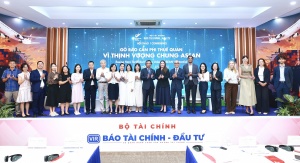INTERNATIONAL INVESTMENT
AND PORTAL

As ASEAN advances towards deeper economic integration, non-tariff barriers (NTBs) are emerging as persistent challenges for the region’s business community. NTBs are no longer merely administrative burdens but strategic factors shaping how companies organise investments, design supply chains, and expand operations.
The landscape of non-tariff barriers in ASEAN: A legal perspectiveASEAN has made significant strides in reducing tariffs through frameworks like the ASEAN Trade in Goods Agreement. However, NTBs related to technical standards, approval procedures, and domestic compliance regulations remain major obstacles. A prominent challenge is the fragmentation of technical standards across member states.
While Vietnam has adopted many national standards aligned with international systems like ISO and IEC, their implementation remains inconsistent across localities, leading to elevated compliance costs – particularly in industries such as electronics, agri-food, and pharmaceuticals.
Licensing requirements and market access also create complex barriers. Conditional sectors like logistics, education, telecommunications, and renewable energy often come with foreign ownership limits, mandatory joint ventures, or lengthy approval processes. These legal structures vary across countries and lack transparency, complicating expansion strategies for both Vietnamese businesses abroad and foreign enterprises in Vietnam.
Additionally, administrative procedures such as customs clearance, visa issuance, construction permits, and environmental licences increase investment uncertainty. Businesses often face delays ranging from 15 to 90 days, especially in emerging sectors like digital services, education, and renewable energy. These obstacles can discourage small- and medium-sized enterprises (SMEs), including many from New Zealand, despite their critical role in green technology and sustainable development.
Moreover, local enforcement practices exhibit high levels of administrative discretion, increasing risks of inconsistent legal application and opaque decision-making. For multinational enterprises operating in ASEAN, this necessitates robust compliance mechanisms and proactive coordination with regulators to navigate differing legal interpretations and applications across countries.
Promising sectors and opportunities for New Zealand businessesDespite legal challenges, ASEAN remains an attractive destination for international investors due to its dynamic economy, young population, and regional trade commitments. For New Zealand, ASEAN offers strategic opportunities in sectors where the country’s strengths align with the region’s development priorities.
In the agri-food sector, rising consumer demand for high-quality, traceable food products opens opportunities for New Zealand businesses in dairy, sustainable agriculture, and cold-chain logistics. However, leveraging these opportunities requires stringent management of technical requirements, import licences, and domestic sourcing regulations.
Renewable energy is another promising area for collaboration. As ASEAN nations push for energy diversification, investors face challenges like inconsistent power purchase agreements, foreign ownership limits, and complex licensing processes. With its leadership in geothermal, wind energy, and sustainable governance, New Zealand can support the region through independent power producer, or public-private partnership models.
Education and vocational training are also rapidly growing sectors. Regional workforce upskilling schemes create opportunities for New Zealand institutions to offer English-language and practical training courses. However, compliance with licensing, curriculum approval, and local partnership requirements remains mandatory.
In the digital economy, the rapid growth of e-commerce and digital infrastructure drives demand for investment in fintech, AI, and cybersecurity. NTBs such as data localisation regulations and uneven intellectual property protections pose significant concerns. New Zealand’s participation in initiatives like the Digital Economy Partnership Agreement could facilitate regulatory harmonisation and foster a conducive environment for investment cooperation.
Proactive legal strategies in a complex geopolitical contextAmid increasingly unpredictable geopolitics, legal preparedness becomes a strategic necessity. Vietnamese and foreign businesses cannot merely react to legal risks, but must adopt a proactive approach. Mapping legal and regulatory frameworks in each country is critical for developing market entry strategies, encompassing labour, environmental, and data regulations.
Contractual frameworks must be tailored to ASEAN’s diverse legal systems, incorporating multi-tiered dispute resolution mechanisms, country-specific indemnity clauses, and contingencies for administrative approval delays.
Intellectual property (IP) protection is a critical pillar. Businesses must proactively register trademarks, patents, and copyrights in target markets to mitigate risks of IP misappropriation or unauthorised use. For enterprises in digital or research and development-driven sectors, a robust IP strategy is key to safeguarding long-term value.
Finally, partnering with reputable local legal advisors offers a strategic advantage. Local partners provide in-depth insight into legal frameworks and practical applications, enabling businesses to address and adapt to compliance requirements proactively. In rapidly evolving sectors like consumer technology and education, these relationships are crucial for efficient operations and effective coordination with authorities.
 Structural barriers still hinder ASEAN enterprise expansion
Structural barriers still hinder ASEAN enterprise expansion
Southeast Asia is becoming a region with high potential for growth that provides attractive investment opportunities for Vietnamese companies as well as for foreign direct investors.
 One ASEAN, one voice: breaking barriers, boosting trade
One ASEAN, one voice: breaking barriers, boosting trade
From strategic policy dialogues to breaking down red tape and reimagining ASEAN as a truly common market, a single message of simplify, harmonise, and open up to emerge so that regional enterprises can not only survive, but truly thrive in a smarter, more connected ASEAN.
 Removing hidden barriers to unlock ASEAN trade
Removing hidden barriers to unlock ASEAN trade
Non-tariff barriers in ASEAN, from hidden environmental rules to fragmented standards, are quietly stalling trade, demanding smarter, more unified responses from regional exporters.
 Soothing non-tariff barriers to improve regional trade
Soothing non-tariff barriers to improve regional trade
Businesses today face growing challenges, geopolitical uncertainty, new tariffs, rising competition, and associated impacts on consumer confidence. While we cannot always control these global headwinds, we can make better use of the frameworks already in place, our free trade agreements, consultation mechanisms, trade norms, and international regulations, and we must continue to improve what remains within our reach.



















